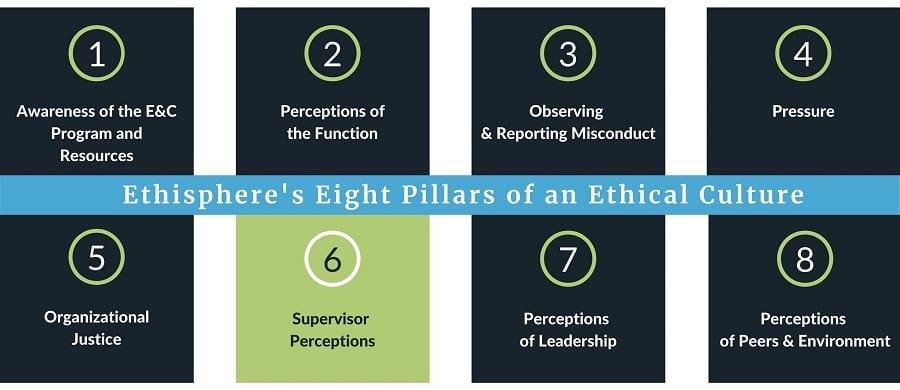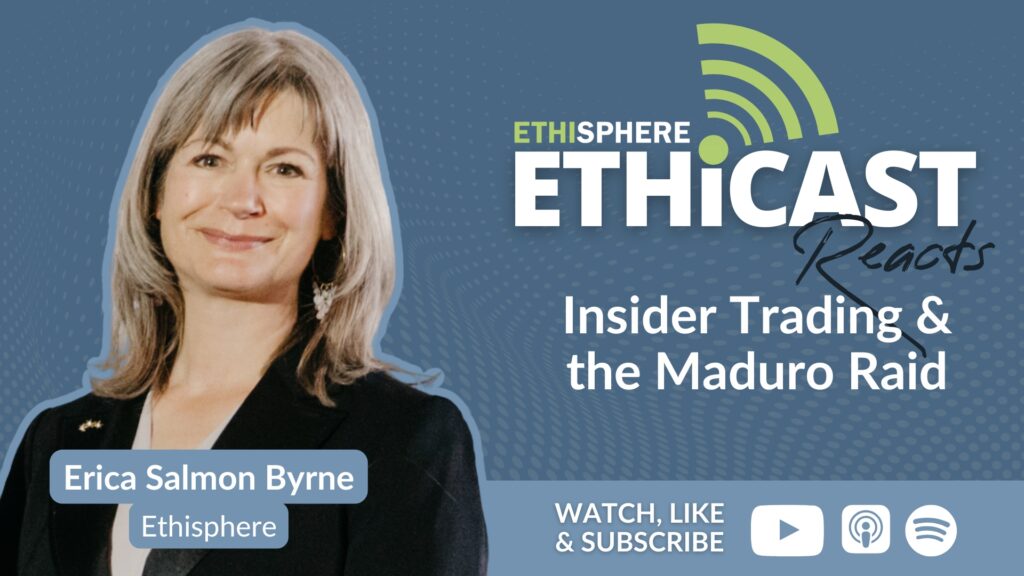
8 Ways to Elevate Ethical Culture: Enabling Managers and Supervisors

AUTHOR:
Douglas Allen, M.B.A.
Managing Director of Data & Services
In this series, we share insights into the eight pillars that make up a robust ethical culture. Our eight pillars seek to get at the key metrics of a strong ethical culture: Do your employees understand what is expected of them? Do they know where to go if they have questions? And, if they need help or have made a mistake, do they trust the process enough to go through with it?
In our previous posts, we’ve discussed:
- Ways to help your employees understand what is expected of them
- How to gage your employees’ perception of the effectiveness of the ethics and compliance communications and training
- What is the strength of your organization’s “speak-up” culture
- The pressure to compromise company standards in the pursuit of achieving business targets
- Perceptions of organizational justice
Today’s post focuses on perceptions of managers and supervisors.

PILLAR SIX:
Supervisor Perceptions
What we aim to measure:
Employee perceptions of their immediate supervisor, and whether that leader is an ethical role model and fosters an environment which encourages questions about and reporting of ethical misconduct.
Types of questions we ask:
- I believe my manager is committed to ethical business conduct at all times.
- I am comfortable approaching my manager with issues or questions related to ethical conduct.
- My manager is consistently a role model for ethical behavior and demonstrates the importance of integrity and ethical behavior.
- My manager discusses ethics or compliance related issues/topics.
Why it matters:
Based our experience and data, managers throughout the organization are the single most influential factor in establishing and maintaining a healthy ethical culture. Managers, by default of their elevated roles, become the most accessible models for how to succeed and advance your career path within an organization. Ensuring managers are modeling the type of decision-making and leadership behaviors that align with the organization’s ethical standards and directives is of paramount importance.
Managers are also the most likely channel to be used by employees when raising a concern about suspected misconduct.
It becomes a significant hurdle for the organization if there are areas within the business where employees become uncomfortable approaching their direct manager – or even their manager’s manager – with concerns.
What the data says:
This pillar tends to be an area that strongly correlates with all other areas of culture measurement:
89 percent of surveyed participants believe their manager is committed to ethical business conduct at all times
88 percent of survey participants expressed they are comfortable approaching their manager with issues or questions related to ethical conduct
76 percent of participants indicated their manager discusses ethics or compliance related issues/topics at least one per quarter on average.
Organizations within the dataset are committed to a strong ethical culture and are leaders at equipping managers to lead ethically and create an open-door environment. However, opportunities still exist to leverage managers as tone-setters for ethical culture throughout an organization.
Nearly a quarter of employees are only being reached by their managers with ethics and compliance related discussions just once per year – or not at all.
It is important to note that within our dataset, employees are more than twice as likely to be comfortable approaching their manager if there are at least quarterly discussions of ethics or compliance related issues/topics by managers.
Managers are the tide that raises all ships with respect to employee perceptions of ethical culture, so increasing the frequency of these communications should remain top of mind for all ethics and compliance functions.
How Ethisphere clients have used the data/insights:
Ethics and compliance leaders often use the data from this pillar to set the tone for manager training, helping managers understand why it is so important that they hear employee concerns, listen with an attitude of appreciation (even if it’s bad news), and know where to go for help addressing an issue or answering an employee question.
It’s also important to note that fostering a “speak up” culture provides benefits beyond ethics and compliance.
When employees feel comfortable raising ethical concerns, they will be more likely to share new product ideas, client challenges, and so much more. Preparing managers to lead teams where everyone is comfortable using their voice is time well spent.
Expert tips for your program effectiveness:
- Provide managers with a variety of resources that facilitate organic discussions about ethics and compliance related topics or issues. Develop the communication assets with appropriate context that anchors the messaging in the “lived” employee experience.
- Establish appropriate metrics – and rewards – for managers to assess performance and adherence to ethical standards.
- Facilitate peer-to-peer knowledge transfer between managers to disseminate practical behaviors and efforts that amplify messaging from the central ethics and compliance function. Champion managers that are doing this at a high level.
As ethics and compliance leaders continue to put significant effort into their program, the question for many remains “is it working?” We hope these insights into our Ethical Culture assessment and data set are helpful in answering that question for you. If you are interested in taking a more detailed look at our data set of 1.1 million employee responses, contact us today to talk to our team about your ethical culture.
Have questions about ethical culture? Schedule time to talk with an Ethisphere expert, or subscribe to our “Culture Corner” newsletter to stay up-to-date on ever-changing culture trends and data.


